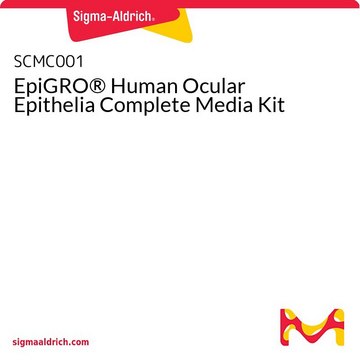SCCE016
Human Corneal Epithelial Cells
Human Corneal Epithelial Cells provide an ideal serum-free culture model without antimicrobials or phenol red when used with the EpiGRO Ocular Epithelia Complete Media Kit.
Synonim(y):
HCEC cells
Zaloguj sięWyświetlanie cen organizacyjnych i kontraktowych
About This Item
Kod UNSPSC:
41106514
eCl@ss:
32011203
NACRES:
NA.71
Polecane produkty
pochodzenie biologiczne
human cornea (epithelial cells)
Poziom jakości
opakowanie
vial of 500,000 cells
producent / nazwa handlowa
Chemicon®
EpiGRO®
Millipore
morfologia
(epithelial)
metody
cell culture | mammalian: suitable
Warunki transportu
liquid nitrogen
Opis ogólny
Human Corneal Epithelial Cells may be used for studies of cell-matrix interactions, gene regulation and tissue development, drug development, and validation of alternative methods in toxicology. The Human Corneal Epithelial Cells are cryopreserved as secondary cells. The cells have been isolated from human corneal tissue and expanded twice in culture vessels before being harvested for cryopreservation. This product is for Research Use Only. This product is not approved for human or veterinary use, or for use in in vitro diagnostic or clinical procedures.
Product Source: Human Corneal Epithelia
Pochodzenie linii komórkowej
Cornea
Opis linii komórkowej
Epithelial Cells
Zastosowanie
Please see data sheet for detailed directions on Thawing, Plating , Feeding, Passaging, etc.
Research Category
Stem Cell Research
Stem Cell Research
Opakowanie
500,000 cells
Komponenty
SCCE016
Jakość
Cells are negative for HIV (1,2), HBV, HCV, bacteria, mycoplasma and fungal contamination.
Further growth: Guaranteed to provide 3 or more passages when grown in the appropriate EpiGRO Medium.
Further growth: Guaranteed to provide 3 or more passages when grown in the appropriate EpiGRO Medium.
Przechowywanie i stabilność
To maintain the cells’ integrity, Millipore recommends unpacking the products immediately upon receipt and storing at a temperature lower than -150°C or in liquid nitrogen vapor phase.
Informacje prawne
CHEMICON is a registered trademark of Merck KGaA, Darmstadt, Germany
EPIGRO is a registered trademark of Merck KGaA, Darmstadt, Germany
Oświadczenie o zrzeczeniu się odpowiedzialności
RESEARCH USE ONLY. This product is regulated in France when intended to be used for scientific purposes, including for import and export activities (Article L 1211-1 paragraph 2 of the Public Health Code). The purchaser (i.e. enduser) is required to obtain an import authorization from the France Ministry of Research referred in the Article L1245-5-1 II. of Public Health Code. By ordering this product, you are confirming that you have obtained the proper import authorization.
Unless otherwise stated in our catalog or other company documentation accompanying the product(s), our products are intended for research use only and are not to be used for any other purpose, which includes but is not limited to, unauthorized commercial uses, in vitro diagnostic uses, ex vivo or in vivo therapeutic uses or any type of consumption or application to humans or animals.
Ta strona może zawierać tekst przetłumaczony maszynowo.
Kod klasy składowania
11 - Combustible Solids
Klasa zagrożenia wodnego (WGK)
WGK 1
Temperatura zapłonu (°F)
Not applicable
Temperatura zapłonu (°C)
Not applicable
Certyfikaty analizy (CoA)
Poszukaj Certyfikaty analizy (CoA), wpisując numer partii/serii produktów. Numery serii i partii można znaleźć na etykiecie produktu po słowach „seria” lub „partia”.
Masz już ten produkt?
Dokumenty związane z niedawno zakupionymi produktami zostały zamieszczone w Bibliotece dokumentów.
Adrian Gericke et al.
RSC advances, 9(39), 22531-22539 (2019-07-22)
Impaired regeneration of the corneal epithelium, as found in many ocular surface diseases, is a major clinical problem in ophthalmology. We hypothesized that corneal epithelial regeneration can be promoted by the physiological, energy-delivering as well as "morphogenetically active" polymer, inorganic
Nasz zespół naukowców ma doświadczenie we wszystkich obszarach badań, w tym w naukach przyrodniczych, materiałoznawstwie, syntezie chemicznej, chromatografii, analityce i wielu innych dziedzinach.
Skontaktuj się z zespołem ds. pomocy technicznej






